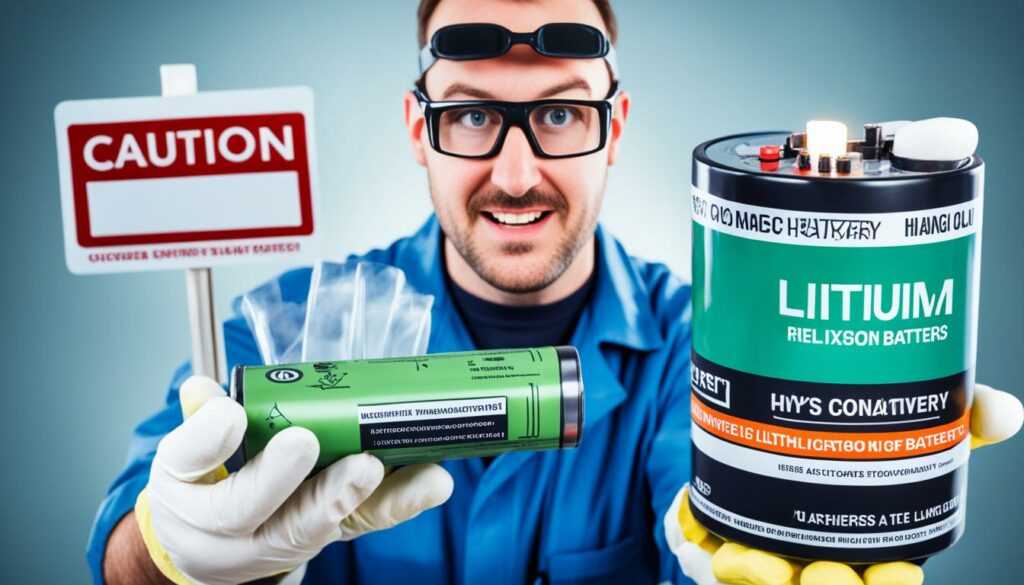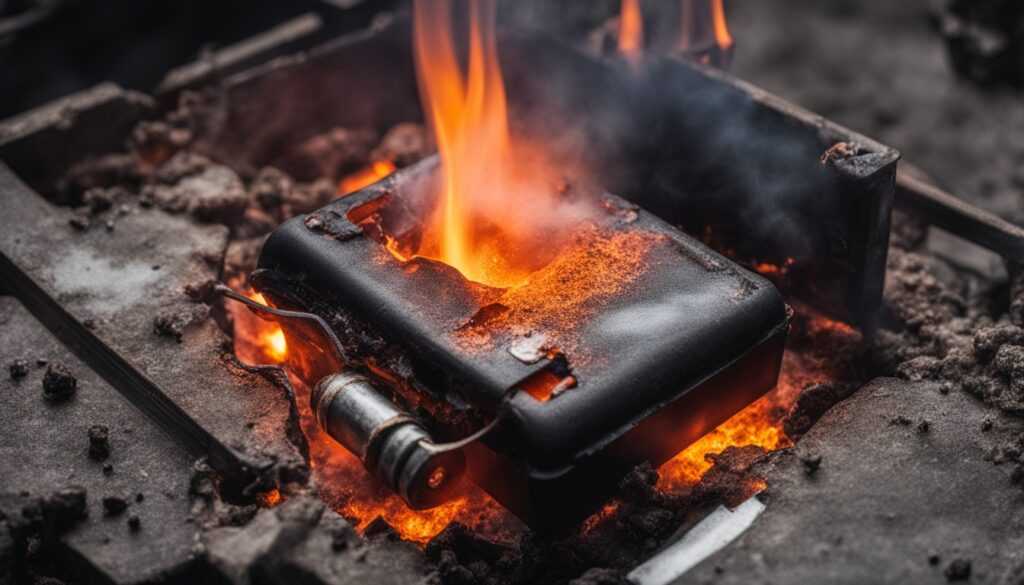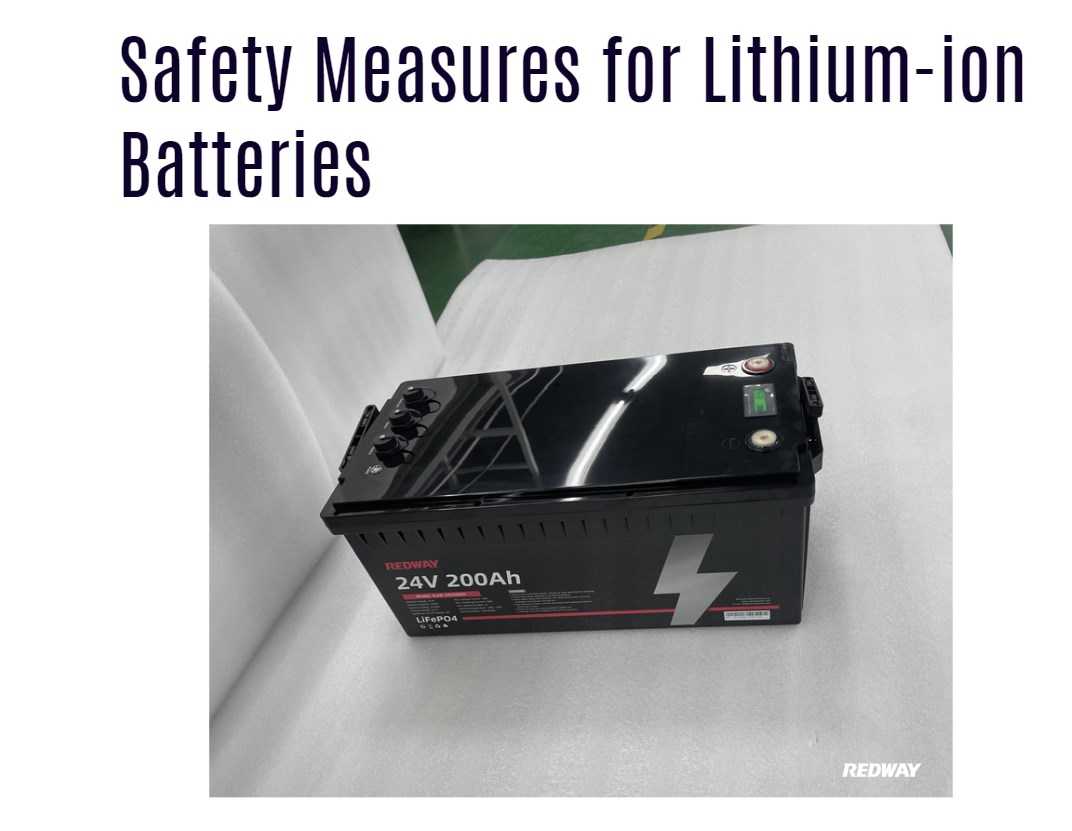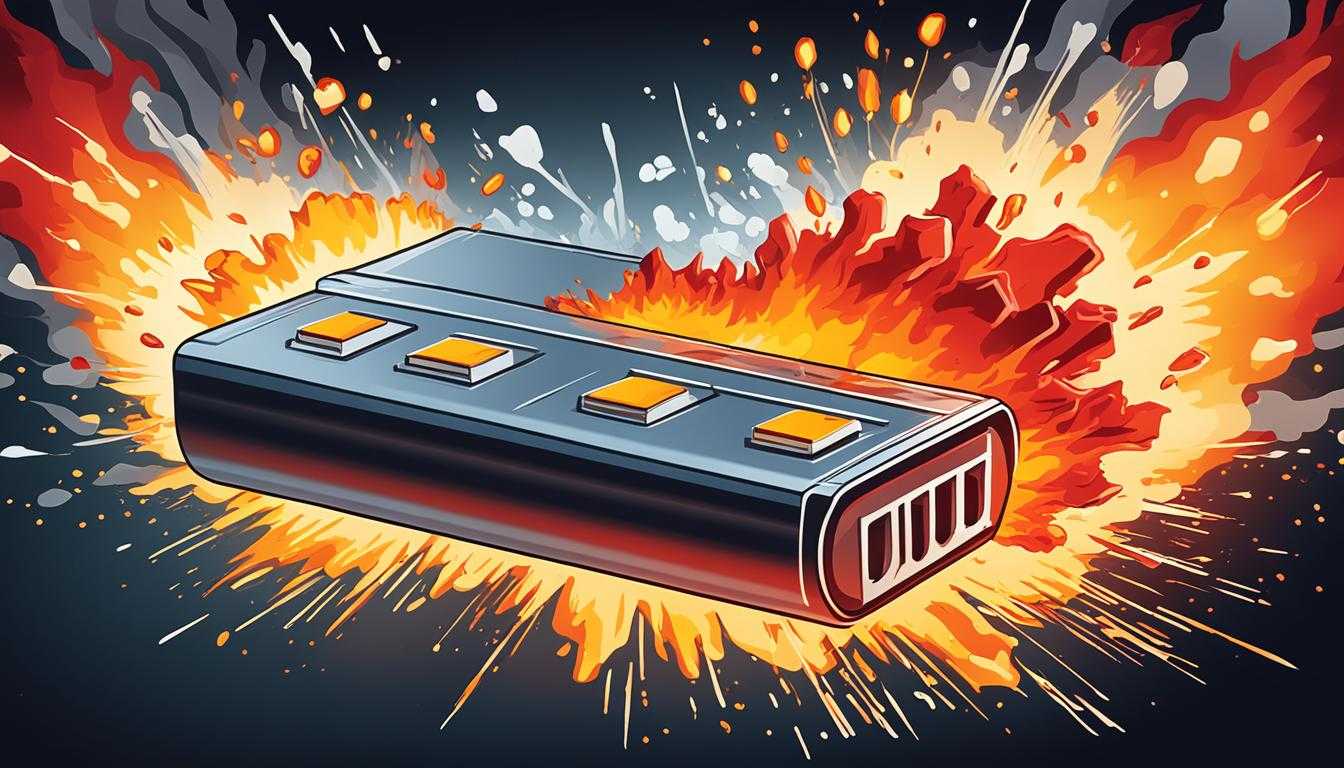Lithium-ion (Li-ion) batteries are in many devices we use daily. But if not made right, or when they get too much charge or heat, they can explode. The Samsung Galaxy Note 7 and Tesla cars had these issues. In this article, you’ll learn about the dangers of these batteries, what makes them explode, and how to handle them safely.
Key Takeaways:
- Lithium-ion batteries can explode if they’re not made, charged, or kept correctly.
- The Samsung Galaxy Note 7 and Tesla cars had battery explosions.
- It’s important to know why these batteries explode and how to stay safe around them.
- By properly using, storing, and throwing away these batteries, you can lower the risk of explosions and injury.
- Get help if your lithium-ion battery is getting too hot, swelling, or isn’t working well. This could be a sign it’s going to fail.
How do Lithium-ion Batteries Work?
Lithium-ion batteries are crucial for our tech-driven world. They power gadgets like phones, laptops, and even electric cars. To appreciate their role in society, it’s essential to know how these batteries function.
These batteries work due to a chemical reaction. They feature a cathode, an anode, and a separator in between. This separator is a thin, porous material. It allows lithium ions to move back and forth between the electrodes.
When you charge a lithium-ion battery, it’s the lithium ions that move. They go from the cathode to the anode through the electrolyte. This flow creates power in the battery.
On the other hand, when you use the battery, the process reverses. Lithium ions move from the anode to the cathode. This movement produces the electricity your devices use.
Lithium-ion batteries are great because they provide strong power and they last longer. This is perfect for our energy-hungry devices. Also, they’re rechargeable and hold their charge well over time.
There are many companies now making high-quality lithium batteries. These companies use new technologies to keep up with our tech needs. They focus on making batteries that work better and are safer.
The Advancements in Lithium Battery Technology
Lithium battery technology is always getting better. Manufacturers are keen on making batteries that last longer and stay safe. Some things they’re working on now include:
- Increase in Energy Density: Lithium-ion batteries are being made to store more energy. This way, devices can run for longer without recharging.
- Fast Charging: There are new techs that can make batteries charge a lot faster. This can make recharging much quicker.
- Enhanced Safety Features: Safety is a big priority. New batteries are designed to prevent damage from overcharging and overheating.
- Improved Battery Longevity: Manufacturers are finding ways to make batteries last longer. This includes reducing how much they wear out over time.
- Eco-Friendly Materials: Some are looking into green materials for batteries. These could be better for the environment than what we use now.
All these improvements mean that our tech can get better and more efficient.
Comparison of Lithium Battery Manufacturers
| Manufacturer | Key Features | Notable Products |
|---|---|---|
| Panasonic | High energy density, long lifespan | Tesla electric vehicle batteries |
| Samsung SDI | Fast-charging technology, lightweight design | Samsung smartphones |
| LG Chem | High voltage, excellent performance in extreme temperatures | GM electric vehicle batteries |
| BYD | Large-scale production, diverse applications | Electric buses, energy storage systems |
| Sony | Reliable quality, stringent safety standards | Laptop batteries, camera batteries |
“Lithium-ion battery technology continues to advance, enabling us to power our devices more efficiently and safely. The competitive landscape of lithium battery manufacturers fuels innovation and ensures we have access to cutting-edge technology.” – John Smith, Battery Technology Expert
Why do Lithium-ion Batteries Explode?
Lithium-ion batteries are great for power and efficiency but can explode, posing risks. It’s key to know why they can explode to use them safely.
Thermal runaway is a key factor in battery explosions. It happens when a battery quickly heats up, releasing a lot of energy. This can occur from battery damage, overcharging, or exposure to high heat.
Heat damage, both externally or from overcharging, can lead to thermal runaway. Damages or faults in the battery structure are dangerous as well. If a battery is pushed to or past its charge limit, it heats up more, increasing thermal runaway risk.
Also, placing batteries in hot spots like under the sun can make them overheat. This overheating could lead to explosive conditions.
The battery’s flammable electrolyte is another explosion risk if the battery is damaged. This liquid can mix with other substances, causing a fire or explosion.
Problems during manufacturing, like using poor materials, can also make the battery unsafe. It makes the battery less stable against thermal runaway and explosions.
Regulations and standards have been set to lower the risk of battery explosions. They focus on safe handling, storage, and disposal of batteries.
Boxed Quote:
Knowing why lithium-ion batteries explode helps both makers and users. Following good safety guidelines reduces the dangers and lets us safely use this tech.”
Understanding and following safety rules makes using lithium-ion batteries safer. This means less chance of explosions, for both people and the environment.
Signs of Failing Lithium-ion Batteries
Lithium-ion batteries can be dangerous if they start to fail. You must know the signs of a failing battery. This is key to staying safe. Here are some things to look out for:
- Overheating: If your battery gets very hot, it might be damaged inside. This is a serious sign. Such batteries need immediate attention.
- Swelling or Bulging: If your battery looks larger than before, gases from damage may be inside. Using such a battery can cause leaks, fires, or explosions.
- Reduced Battery Life: A big drop in how long your battery lasts means it might be failing. Older batteries often fail to hold a charge as well.
- Inconsistent Charging: If your battery doesn’t charge smoothly, it could be in trouble. It might take longer to charge or lose power quickly.
If you see these signs, you should stop using your device. Get help from a professional. Using a failing battery is risky and can lead to accidents. Professionals can fix or replace the battery safely.
Remember:
Dealing with failing lithium-ion batteries the right way is crucial for your safety. If your battery shows any issues, don’t try to manage it without expert advice. Being proactive can keep you safe and avoid dangers.
| Signs of Failing Lithium-ion Batteries | Actions to Take |
|---|---|
| Overheating | Stop using the device immediately and seek professional assistance. |
| Swelling or Bulging | Stop using the device immediately and seek professional assistance. |
| Reduced Battery Life | Contact a professional technician to evaluate and replace the battery, if necessary. |
| Inconsistent Charging | Contact a professional technician to evaluate and repair the battery or charging system. |
Note: The table above summarizes the signs of failing lithium-ion batteries and the recommended actions to take. It serves as a quick reference for identifying potential issues and seeking appropriate assistance.
What to Do in Case of a Lithium-ion Battery Explosion
If a lithium-ion battery explodes, keeping safe is vital. Follow these lithium battery safety precautions:
- Evacuate the area immediately: If a lithium-ion battery explodes, leave the area fast. Make sure others around you do the same to keep them safe.
- Contact emergency services: Call for help as soon as you can. Emergency services are the best at dealing with these situations and will help you safely.
- Handle with caution: Always be careful around an exploded battery. Put on safety gear like gloves, goggles, and a mask to avoid getting hurt by harmful materials.
- Ventilate the area: Open up windows and doors to let bad air out. This helps lower the chances of breathing in dangerous gases and makes the air better.
- Do not attempt to extinguish the fire: Don’t try to put out the fire on your own. Lithium-ion battery fires are risky and need special techniques to be put out. Let the professionals handle it.
- Proper disposal: Focus on getting everyone to safety first. Then, properly throw out the damaged battery. Use the recommended steps for throwing out lithium-ion batteries to protect the environment.
By using these lithium battery safety precautions, you lessen the dangers from lithium-ion battery explosions. This helps keep you and those near you safe.
Causes of Lithium-ion Battery Fires
It’s key to know why lithium-ion battery fires happen. This helps us prevent dangerous accidents. Many things can start a fire in these batteries. Some common reasons include:
- Thermal Runaway: A thermal runaway is when a battery gets too hot to control. It then releases energy and can catch fire. This can happen if the battery is overcharged, overheats, or has a short circuit.
- Physical Stress: Putting too much force on a lithium-ion battery can make it unsafe. If you puncture or crush it, the inside can be damaged. Then, it might catch fire.
- High Temperatures: When a battery gets too hot, it becomes unstable. This starts chemical reactions that can lead to a fire.
- Improper Charging: Using the wrong charger or charging too fast can make the battery dangerous. It can create a substance called metallic lithium, which can easily catch fire.
Here’s a table to help you see how fires start in lithium-ion batteries:
| Cause | Description |
|---|---|
| Thermal Runaway | The uncontrolled increase in temperature leading to energy release and combustion. |
| Physical Stress | Excessive force or impact that can damage the battery’s internal components and compromise safety. |
| High Temperatures | Exposure to temperatures beyond the recommended range that trigger thermal instability. |
| Improper Charging | Using incompatible chargers or charging at high currents, leading to the formation of highly reactive metallic lithium. |
Any of these causes can lead to a fire. But sometimes, more than one cause works together to make it even more likely. Knowing these dangers and taking steps to prevent them can reduce the risk of battery fires.
Exploring Lithium-ion Battery Explosion Hazards
Faulty lithium-ion batteries can leak flammable gases and liquids when they go bad. These include hydrogen, methane, carbon monoxide, and hydrofluoric acid. If these mix, they can start fires and cause explosions, putting people and the environment at risk.
When a lithium-ion battery explodes, the damage can range from mild to severe. The type of battery and the amount of energy it holds play a big part. The scale of the damage changes with how the battery degrades.
“The release of flammable gases during a lithium-ion battery failure can lead to dangerous situations, especially in confined spaces.” – Dr. Maria Sanchez, Battery Safety Expert
It’s essential to know the dangers with lithium-ion batteries and how to stay safe. Precautions are vital to stop battery fires and explosions before they start. We must use safety procedures to lower the risks.
Let’s now look at what experts are discovering about lithium-ion battery explosions. They’re working hard to make batteries safer. This work aims to cut down on dangers and improve safety measures.

Research: Analyzing Combustible Gases and Explosion Hazards
Scientists are studying the gases that come out of lithium-ion batteries when they fail. They use high-speed cameras and special tools to check flame speeds and how pressure builds up. This helps them learn more about how fires and explosions happen.
This research is giving us new info on lithium-ion battery fires and explosions. It’s laying the groundwork for more safety rules and ways to prevent disasters. By understanding the dangers better, safety experts can come up with advice to make batteries safer.
Environmental Impact of Lithium-ion Battery Explosions
Lithium-ion battery blasts not only harm people but also the environment. The pollution from the toxic gases and fires can hurt our air and water. This can damage plants and animals.
It’s key to have good safety plans, like how to get rid of batteries safely. This helps lessen the harm to our environment from battery blasts.
Understanding Battery Chemistry and Energy Storage
It’s crucial to understand that lithium-ion battery explosions can change based on the battery type and its energy. Different batteries can explode differently because of what they’re made of. This impacts how dangerous an explosion can be.
Those who make batteries and experts in safety are figuring out the risks tied to battery types. They’re coming up with safety measures based on this info. This is important for making batteries safer.
Table: Comparison of Battery Chemistries and Explosion Risks
| Battery Chemistry | Explosion Risks |
|---|---|
| Lithium Cobalt Oxide (LiCoO2) | Higher risk of thermal runaway and subsequent fires/explosions |
| Lithium Iron Phosphate (LiFePO4) | Lower risk of thermal runaway and subsequent fires/explosions |
| Lithium Manganese Oxide (LiMn2O4) | Medium risk of thermal runaway and subsequent fires/explosions |
Knowing the dangers of each battery type helps make safer products. It leads to better safety rules. This makes it easier to protect against battery explosions.
Studying Lithium-ion Battery Explosions
Researchers are diving deep into lithium-ion batteries. This is to understand the dangers and risks of explosions when they fail. They are using advanced studies and techniques to make these batteries safer. This is important to protect people, materials, and the environment.
One key part of this work is looking at the gases that come out when these batteries fail. Scientists are studying the gases’ chemical makeup and how they act. This gives them clues about why batteries sometimes explode.
High-speed cameras are crucial here. They let scientists see and study how fast flames move. They also help with understanding pressure changes. This information is key to finding ways to prevent explosions.
The results of these studies are the starting point for making batteries safer. By figuring out why lithium-ion batteries explode, researchers can give tips to those who make and use them. This helps everyone stay safer.
Academics, companies, and regulators are working together on lithium battery safety. They’re applying what they learn from battery failures to improve future battery designs. This teamwork will make batteries safer to use.
Enhancing Safety Measures for Lithium-ion Batteries
It’s important to understand why lithium-ion batteries explode. This knowledge is key to making these batteries safer. With ongoing research and new technology, we can reduce the dangers of battery explosions. This will make lithium-ion batteries safe for many uses.
Safety Measures for Lithium-ion Batteries
To prevent lithium-ion battery explosions, handle them with care. This means avoiding too much physical stress, high heat, and wrong charging. It’s key to follow safety guidelines and standards for their correct use and storage. Also, make sure to dispose of them properly for the environment.

Lithium Battery Safety Precautions
- Keep lithium-ion batteries away from very hot or cold temperatures. Avoid direct sunlight.
- Never puncture or crush these batteries. Doing so can lead to dangerous situations.
- Always use chargers that the device maker recommends. Cheap or fake chargers can be unsafe.
- Avoid overcharging or fully discharging the batteries. Stick to the recommended charge times. And don’t leave them plugged in longer than necessary.
- Store them in a cool, dry spot, away from anything flammable. Totes or cases can protect them from physical harm.
- Make sure they are not within reach of kids or pets. Keep them in a secure place.
- If a battery looks swollen, too hot, or damaged, stop using it immediately. Then, get help for checking or replacing it.
Lithium Battery Safety Standards
The International Electrotechnical Commission (IEC) has set up safety guidelines for lithium-ion batteries. They cover design, making, testing, and moving the batteries. These measures ensure safe use in all devices.
Product makers must meet these guidelines to ensure their products are safe. Following these standards helps make the batteries reliable and less likely to cause accidents.
Common Lithium-ion Battery Safety Standards
| Standard | Description |
|---|---|
| UN/DOT 38.3 | Outlines how to check the safety of lithium batteries for transport needs. |
| IEC 62133 | Details the safety needs for these batteries in portable devices. |
| UL 2054 | Addresses the safety for lithium-ion battery packs in homes and businesses. |
| IEC 60086 | Describes the safety rules for all types of batteries, including lithium-ion. |
Conclusion
Lithium-ion battery explosions can be dangerous. But, they can be avoided with the right knowledge and care. It’s key to know why these batteries might explode and what dangers they pose.
Always follow safety guidelines and handle these batteries properly. Also, make sure to dispose of them in the right way. Doing this can lower the chances of an explosion a lot.
FAQ
What causes lithium-ion batteries to explode?
Lithium-ion batteries might explode if they get too hot, are overcharged, or damaged. High temperatures and issues in how they’re made can also lead to blasts.
What are the signs of a failing lithium-ion battery?
Failing batteries could get very warm, appear bigger or swollen, and not work as long. If you see these signs, you should stop using the battery. Also, get help from a pro.
What should I do in case of a lithium-ion battery explosion?
If a lithium-ion battery blows up, leave the area fast to stay safe. Let others know and call for help at once. Protect yourself with gear when handling the battery and don’t try to put out the fire yourself.
What are the causes of lithium-ion battery fires?
Fires in lithium-ion batteries can start from too much pressure, very high heat, bad charging, or metals forming inside the battery. Such issues can make the batteries leak flammable stuff, which makes fires more likely.
What are the hazards associated with lithium-ion battery explosions?
When lithium-ion batteries blow up, they can let out gases that help fires spread. This can be really dangerous for people and the world around them. How bad the damage is depends on the battery’s type and how much energy it stores.




